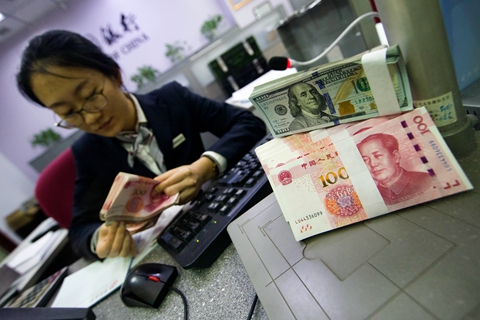China to Reform QDII in Financial Liberalization Push

China’s foreign exchange regulator is considering reforms in the Qualified Domestic Institutional Investor (QDII) mechanism, in a move to further liberalize the country’s capital market.
The State Administration of Foreign Exchange (SAFE) said Wednesday in a brief statement that it will launch studies on QDII program participants and their business operations. The administration will work with other government agencies to push forward QDII reforms and improve macro-prudential management of the program to better meet investors’ demands and reflect market development.
“This signals further reform to liberalize the foreign exchange market,” said Xie Wei, vice president of Bank of Communications Schroder Fund Management Co. (BoCom Schroder). Xie said the SAFE’s move indicated regulators’ intent to wider open the country’s capital market.
Sources close to the matter told Caixin that the reform will seek to work out specific arrangements that fit different institutions based on their business type, asset size and internal operations in order to improve the transparency of the quota system.
Issuance of new quotas, which has been suspended for 36 months, will also be resumed, sources said. SAFE said in the statement that it will update information about QDII quota every month.
Xie Yaxuan, chief economist at China Merchants Securities, said the resumption of QDII quota approval will encourage capital flows between China and overseas markets. It also indicated that China’s foreign exchange policy has returned to normal as capital flows stabilized after tightening controls to rein in capital flight since 2015, said Xie.
The QDII program was created in 2006 allowing financial institutions that meet certain qualifications to invest in overseas securities and bonds. It was the only avenue for domestic individual investors to legally gain access to offshore capital markets under the country's capital controls, until 2014 when the Shanghai-Hong Kong stock connect program was launched.
Data from SAFE show that a total of $90 billion in QDII quotas was granted to 132 qualified institutions from 2006 through March 2015. Since then, no new quotas have been handed out, part of regulators' efforts to stem rising capital outflows.
At a 2016 news conference, SAFE’s capital account management director, Guo Song, said the administration was coordinating with other agencies to seek expanding the quota.
Under the suspension of new quota approval, existing QDII quotas have become valuable assets. Although there are restrictions on quota sale or transfer, many holders have found ways to skirt the rules and let other institutional investors use their quotas in return for a hefty fee, triggering a crackdown by the regulator.
Fan Yue, vice president of E Fund Management Co., said domestic investors’ appetite of overseas assets has been growing quickly since last year, fueling demands of QDII quotas. “It will be a very good news for domestic investor seeking to diversify their portfolios, if new quotas can be issued,” said Fan.
Liu Xiuyan, assistant to president of China Southern Fund Management Co., said with new quotas, institutions will be able to offer better products to meet investors’ rising demands of overseas assets.
Funds with investments through QDII outperformed most other investment products in 2017. Data from Windinfo showed that the average annual return of QDII funds was 16.2%. But amid frequent market fluctuation this year, the return rate has declined dramatically in the first quarter.
BoCom Schroder’s Xie said banks, insurance companies and large state-owned enterprises are highly interested in getting QDII quotas as they eagerly seek to diversify assets with overseas investments. “China’s economy has changed a lot over the past three years and investors are getting more rational, driving China to increasingly integrate with the global financial market,” said Xie.
China’s central banker governor, Yi Gang, pledged at the Boao Forum for Asia Annual Conference on Wedensday that China will push forward capital account liberalization. China will put some of its promised policies to further open up its financial sector as early as June, with more liberalization measures to follow by the end of the year, Yi said.
Contact reporter Han Wei (weihan@caixin.com)

- 1Cover Story: China Carves Out a Narrow Path for Offshore Asset Tokenization
- 2Drownings Shake Chinese Enthusiasm for Travel to Russia
- 3Over Half of China’s Provinces Cut Revenue Targets
- 4Li Ka-Shing’s Port Empire Hit by Forced Takeover Amid Panama Legal Dispute
- 5In Depth: China’s Mutual Fund Industry Faces Overhaul After a Banner 2025
- 1Power To The People: Pintec Serves A Booming Consumer Class
- 2Largest hotel group in Europe accepts UnionPay
- 3UnionPay mobile QuickPass debuts in Hong Kong
- 4UnionPay International launches premium catering privilege U Dining Collection
- 5UnionPay International’s U Plan has covered over 1600 stores overseas






